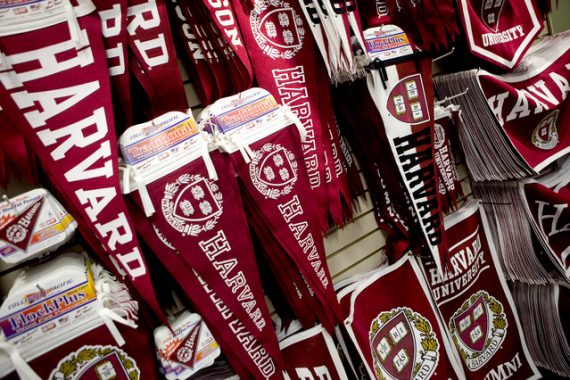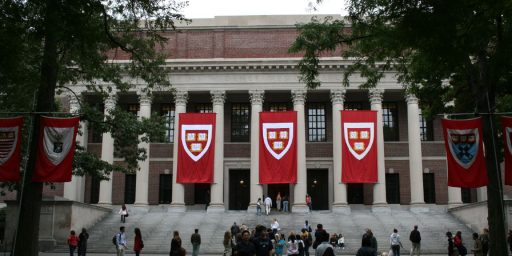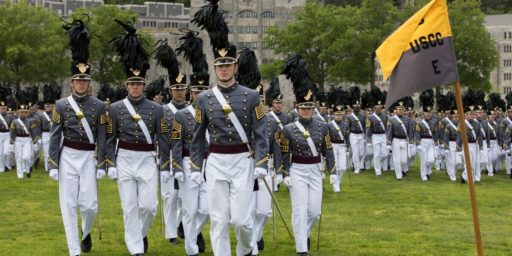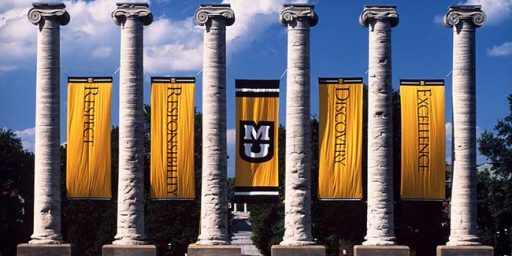Harvard Says 125 Students May Have Cheated In ‘Introduction To Congress’ Class
Harvard has announced the discovery of what one official calls an "unprecedented" cheating scandal.
Harvard University is being rocked by one of the biggest academic cheating scandals I’ve seen in a long time:
CAMBRIDGE, Mass. — Harvard University revealed Thursday what could be its largest cheating scandal in memory, saying that about 125 students might have worked in groups on a take-home final exam despite being explicitly required to work alone.
The accusations, related to a single undergraduate class in the spring semester, deal with “academic dishonesty, ranging from inappropriate collaboration to outright plagiarism,” the administration said in a note sent to students.
Officials said that nearly half of the more than 250 students in the class were under investigation by the Harvard College Administrative Board and that if they were found to have cheated, they could be suspended for a year. The students have been notified that they are suspected and will be called to give their accounts in investigative hearings.
“This is unprecedented in its scope and magnitude,” said Jay Harris, the dean of undergraduate education.
Administrators would not reveal the name of the class or even the department, saying that they wanted to protect the identities of the accused students. The Harvard Crimson, the university’s student newspaper, reported that it was a government class, Introduction to Congress, which had 279 students, and that it was taught by Matthew B. Platt, an assistant professor.
Professor Platt did not respond to messages seeking comment.
When final exams were graded in May, similarities were noticed in the answers given by some students, officials said, and a professor brought the matter to the administration immediately. Over the summer, Harvard’s administrative board conducted an initial review, going over the exams of all of the students in the class for evidence of cheating. It concluded that almost half of them showed signs of possible collaboration.
The Harvard Crimson provides additional details:
If found guilty of academic dishonesty, students could be required to withdraw from the College for a year, among other possible sanctions.
The final examination in ”Introduction to Congress,” which included three multi-part short answer questions, a bonus short answer question, and an essay question, came with the instruction: ”The exam is completely open book, open note, open internet, etc. However, in all other regards, this should fall under similar guidelines that apply to in-class exams. More specifically, students may not discuss the exam with others—this includes resident tutors, writing centers, etc.”
Dean of the Faculty of Arts and Sciences Michael D. Smith sent an email to all faculty members about the case, and Harris also sent a message to the student body and their parents on Thursday. That letter said that all students who are under investigation have been contacted.
Harris said the College’s unusual step of announcing the investigation was intended in part to launch a broader conversation about academic integrity.
“It’s something that I think was obviously not going to stay secret, clearly, and nor do we want it to,” Harris said. “I think it’s important for us to be able to take an event like this and teach it, treat it as a teaching opportunity.”
A junior government concentrator who took the class last spring said she suspected that Government 1310 was the course in question when she received Harris’ email Thursday. Though she said she followed the exam instructions and is not being investigated by the Ad Board, she said she thought the exam format lent itself to improper academic conduct.
“I can understand why it would be very easy to collaborate,” said the student, who was granted anonymity by The Crimson because she said she did not want her name associated with plagiarism allegations. “It was almost like a science exam that you take in person, but at home…. Many of the questions were, ‘Find the answer and basically say why this is the way it is.'”
I can’t honestly say I’ve ever seen an academic cheating scandal that involved this many potential violators ever before. However, I can see how in this day and age it would be very easy for a large group of people to collaborate and trade answers on a take home exam like this quite easily using electronic methods like e-mail, text messages, and Twitter Direct Messages. It also makes one wonder just how prevalent cheating like this is on these kind of “take home” exams.
Furthermore, I don’t recall ever having this kind of exam when I was in college back in the late 80’s. Occasionally, exams would be replaced by end-of-term paper or research project, which would sometimes be optional so one could either take the exam or do the paper, but never an actual exam. The same thing was true of law school. Is this a new development in academia? I’d almost be interested to see this test to see exactly what the students were being asked to do, because it often seemed to me like those “open book” tests tended to be far less rigorous than they probably needed to be.
The other question that arises is, assuming these allegations are true, what exactly these students were thinking when they were doing this. They’re at Harvard University, so they’re all obviously highly intelligent.This appears from the description to be an introductory level Political Science course, difficult perhaps but not exactly Ph.D. level either. They’ve obviously got to be aware of the consequences they could suffer if they’re caught cheating, including penalties that would be a permanent stain on their academic record even if they ended up going to another school. They’re taking a test where they’re permitted to consult any source material, including the Internet. What in the name of all that is holy would compel as many as 125 Harvard students to not only cheat, but to apparently do it in such a manner that it could be so easily detected? It really does defy logic.
The other point to keep in mind, of course, is that these are merely allegations at this point and that none of these people has either admitted to cheating or been proven to have done it. However, the fact that the university made the matter public, albeit without identifying those accused for obvious reasons, would seem to indicate that they believe that they have a fairly strong belief that there was cheating involved here. If that’s true, I’ve got a feeling some of these students are going to be at Harvard for very much longer.







Wow, that’s the equivalent of about 3 SEC football teams.
Yes take-home exams are used today, but they are not necessarily the norm. They are mostly used in intro level classes.
My question to the academia: Don’t you expect some sort of collaboration when you assign students take-home exams?
Fifty percent of the class cheating in an “Introduction to Congress” class. Strangely ironic.
Another possibility, in this internet age, that some of the similarities are from using the same results from internet searches.
I had many open book tests in the sciences up to the graduate level. I also had several such exams in history and religion. I gotta say that being ‘open book’ didn’t make anything easier as the questions weren’t things that merely finding the right passage would help. Demonstrating the synthesis of ideas was necessary. However, this was before Google when it would’ve been much harder to find ‘pre-synthesized’ answers.
Now it’s probably easier to find shortcuts. Note that if someone is too lazy to actually do the work, they’re probably also too lazy to transcribe the answers into their own words.
I think that comments on this story are premature. It may turn out to have been completely harmless, as SKI suggests. Or it may be cheating. Hard to say at this point.
Dave Schuler is probably right. We assume the cheating investigation to be a bad thing but given the subject matter, these students may ben conferred Masters degrees in Government for their deep understanding of modern American governance.
“so they’re all obviously highly intelligent.”
This assumes facts not in evidence. They all obviously did well on secondary school testing, perhaps not honestly given the current circumstances but it does not imply intelligence. A lot of intelligent people go to Harvard but going to Harvard does not ensure you are intelligent.
In my undergrad days (mid 90s) I don’t think I had any take-home exams. When I got my MS in Accounting, I did not have any, but in the department, hybrid exams (1/2 take home, 1/2 in class) were fairly common in 300 and 400 level classes – mostly because it is well-nigh impossible to fully test both your understanding of both theory and your ability to assemble schedules and filings within a 75 minute period.
When you’re talking about 125 students, I don’t see how that can be intentional collusion – there’s just too many people. It seems much more likely that half the class used one of the top two or three Google hits for most of the questions and kept key words from the source material without much synthesis of knowledge. Or that the Professor’s instructions were unclear and/or that the students were following precedent set by previous classes and the TAs who have been doing the grading for a number of years didn’t think it was a big deal.
Really? The 1992 Annapolis cheating scandal came immediately to mind:
http://www.nytimes.com/1994/01/13/us/an-inquiry-finds-125-cheated-on-a-naval-academy-exam.html?pagewanted=all&src=pm
Actually, it really does.
Now, given that, you can be intelligent in one way and stupid in another — you can, for example, be intelligent in math and science, but an idiot at interpersonal relationships. Or you can be a brilliant writer, but hopeless at psychics. But rest assured, you don’t get into Harvard in this day and age without being ferociously intelligent.
I expected many more comments along the lines of
“It could probably be shown by facts and figures that there is no distinctly native American criminal class except [students of] Congress.”
“If you don’t cheat, don’t you fail?”
“Nothing like proper preparation an an Ivy League college”
College students cheating ??!!!?
I am shocked, SHOCKED to hear of such a thing occuring!
.
(… um …watcha get for #3 ?)
@SKI: “Another possibility, in this internet age, that some of the similarities are from using the same results from internet searches.”
Which may be why plagiarism is one of the accusations.
Mike
I don’t recall ever having a take home exam in college (this was also back in the 1980’s).
My daughter just complete her freshman year of college and didn’t have any take home exams (she is a Bio/Chem major) although she has only complete one year.
If this is true I am mostly left wondering why students who had to be extremely bright to get into Harvard would cheat-you would think they could handle answering the question without violating the rules.
I graduated from Hollins College (now Hollins University) in 1959. We had a strong Honor System; professors often assigned ‘take-home’ exams, for when a student signed her paper she was declaring it was her work, under the prof’s instructions. We dreaded them. Aside from basic information, books were seldom useful. One had a choice: say, answer 2 of the 3 questions. Those questions (often, statements) were open ended and demanded you express your opinion and backed it up. Some profs allowed group discussions; others forbade them. I remember such exams in history, philosophy and calculus.
Back in my day (6 years ago), we had a few take home exams, however they weren’t the type that would easily lead to cheating. Most involved 10 to 12 questions which had to be answered with extended essays. They were “take home” because the professor realized it would be really quite unfair to ask the students to write 20-30 pages of writing and cite their sources from memory.
My other thought on this subject is…why?
Take home exams are take home for one reason: The professor wants you to look up the answers/sources/back up your work. Why cheat when you are actually being encouraged to reread your studies and ensure you are correct?
In 1976 over 130 cadets at West Point either resigned or were separated due to cheating.
Well, this is sort of like similarities in copyright. Are we so sure that the students collaborated, versus their looking up the same stuff on line?
If 90% of the similar material turns out to be on Wikipedia or from the first page of Google Search results, then I’d say there’s not much of a case.
I had occasional take-home exams in the 1970’s. One final exam in mathematics with six questions was excruciatingly difficult. Cheating would have been impossible under those circumstances – it would have been obvious if collaboration was occurring.
Hmmm, about 7 years ago I took the Mensa IQ exam and ranked in the top 2% but I did not attend Harvard, Yale or any other prestigious University. I went to Kaplan University (online) for my education to earn a BS in business administration/finance and MBA w/concentration in finance. Does this mean I am not a highly intelligent person? I find it ironic that my IQ is higher than most people who attend such prestigious Universities.
Also, internet resources often lead people to the same exact webpages, documents and other articles. I know this because a student plagerized from an article I immediately recognized from a reference in a previous research paper. I brought it to the Professor’s attention. Google in key words and see what comes up for references.